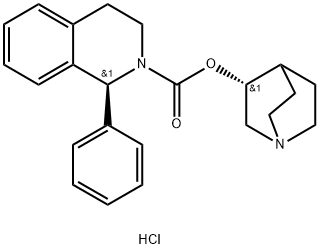180468-39-7
 180468-39-7 結(jié)構(gòu)式
180468-39-7 結(jié)構(gòu)式
基本信息
Solifenacin Hydrochloride
(1S)-3,4-Dihydro-1-phenyl-2(1H)-isoquinolinecarboxylic Acid (3R)-1-Azabicyclo-[2.2.2]oct-3-yl Ester Hydrochlorid
(1S)-3,4-Dihydro-1-phenyl-2(1H)-isoquinolinecarboxylic Acid (3R)-1-Azabicyclo-[2.2.2]oct-3-yl Ester Hydrochloride
(1S)-3,4-Dihydro-1-phenyl-2(1H)-isoquinolinecarboxylic acid (3R)-1-azabicyclo[2.2.2]oct-3-yl ester hydrochloride (1:1)
| 報(bào)價(jià)日期 | 產(chǎn)品編號(hào) | 產(chǎn)品名稱 | CAS號(hào) | 包裝 | 價(jià)格 |
| 2025/02/08 | HY-I0230 | 索利那新鹽酸鹽 Solifenacin hydrochloride | 180468-39-7 | 10mg | 550元 |
| 2025/02/08 | HY-I0230 | 索利那新鹽酸鹽 Solifenacin hydrochloride | 180468-39-7 | 10mM * 1mLin DMSO | 610元 |
| 2025/02/08 | HY-I0230 | 索利那新鹽酸鹽 Solifenacin hydrochloride | 180468-39-7 | 25 mg | 1150元 |
常見問(wèn)題列表
Muscarinic receptor
Solifenacin hydrochloride (YM905 hydrochloride) is a novel muscarinic receptor antagonist with pK i s of 7.6±0.056, 6.9±0.034 and 8.0±0.021 for M1, M2 and M3 receptors, respectively. In murine submandibular gland cells, the antagonistic effects of 100 nM Solifenacin hydrochloride and oxybutynin on Ca 2+ mobilization evoked by varying doses of carbachol (CCh) are examined. Solifenacin hydrochloride does not shift the CCh dose-activation curve in a parallel manner whereas oxybutynin shows insurmountable antagonism. The pK b values are obtained as 7.4±0.17 for Solifenacin hydrochloride and 8.8±0.21 for oxybutynin.
Solifenacin hydrochloride (YM905 hydrochloride) reduces bladder responses by 40% at a dose of 210 nmol/kg (0.1 mg/kg) and abolishes them at 2100 nmol/kg (1 mg/kg). In contrast, its inhibitory effects on salivary and cardiac responses are only slight at 630 nmol/kg (0.3 mg/kg), and reach 66% and 49%, respectively, at 2100 nmol/kg (1 mg/kg). At doses of 63 and 210 nmol/kg (0.03 and 0.1 mg/kg), Solifenacin hydrochloride slightly increases saliva secretion. Solifenacin hydrochloride (0.01 to 0.3 mg/kg i.v.) dose-dependently increases bladder capacity and voided volume at doses of 0.03 mg/kg i.v. or more, but does not affect residual volume or micturition pressure at any dose tested.